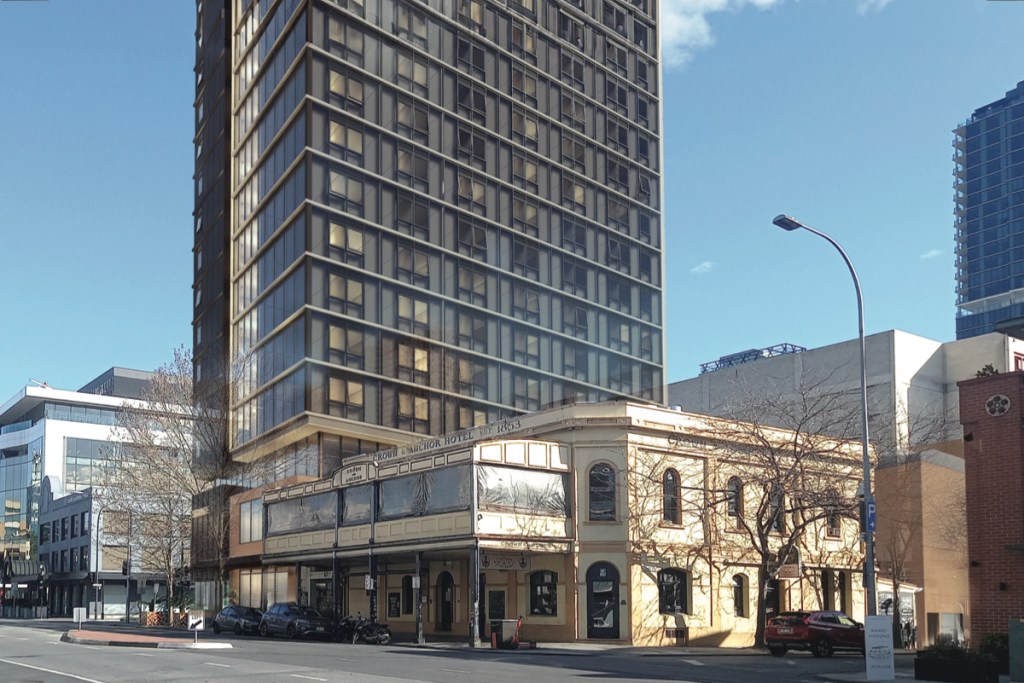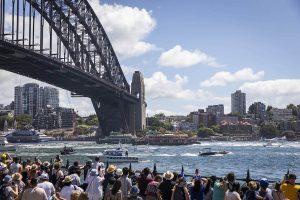Cranker development owner makes student accommodation ‘exit’ – News | InDaily, Inside South Australia

- by Admin
- December 19, 2024

Wee Hur Holdings announced this week that it sold its Australian purpose-built student accommodation (PBSA) portfolio to a US real estate investment firm for $1.6 billion.
But the company maintains ownership of the Crown & Anchor Hotel as the property was not included in the divestment. The implications for the 19-storey student tower project are unclear, with the company previously flagging an anticipated softer international student market from 2025. Wee Hur did not respond to questions from InDaily about the project today.
Under the sale, Wee Hur retains a 13 per cent stake in the portfolio of seven properties in Australia – including two student accommodation projects in Adelaide: Y Suites City Gardens and Y Suites on Waymouth.
The sale to US-based Greystar also includes one UniLodge in Brisbane, two Y Suites in Sydney, one development in Melbourne and a property in Canberra.
Wee Hur Holdings is the company behind the proposed student accommodation tower that has secured permission to rise next to the historic Crown & Anchor Hotel.
InDaily is not suggesting the company has abandoned the Grenfell Street student accommodation project at this time.
But the divestment follows Wee Hur telling shareholders in August that it anticipated a softer international student market moving forward because of planned international student caps, proposed by the federal government to commence in 2025, and comes amid “several challenges” for its PBSA portfolio.
The company’s initial plan for the Crown & Anchor site included “partial demolition” of the pub, leaving just the façade to make way for a 19-storey student apartment tower.
The plan sparked significant public backlash and led to a community-driven campaign to “save” the beloved East End pub.
The state government eventually intervened and announced a historic deal to rescue the pub. Special-purpose legislation was then passed to protect the Cranker from ever being demolished and to confirm its continued use as a pub and live music venue.
Wee Hur then lodged a development application (DA) for a revised student accommodation tower that would avoid demolishing the Cranker but would see hospitality venues Roxies and Chateau Apollo razed to make way for the project. The pub would also close for two years during the build, and the band room would be renovated over that time.
That DA received planning consent by the State Planning Commission on 21 October 2024, subject to conditions. Building consent and final development approval are still required.
A crowd of up to 2000 marched from Victoria Square to Parliament House on North Terrace in support of the Cranker before the deal to save it was announced. Photo: Helen Karakulak/InDaily
Earlier this year, InDaily reported the pub’s two-year closure was likely from April 2024, but as the Cranker’s publican has not been given notice to leave that date has been pushed out until at least mid-year.
In a press release about the divestment, Wee Hur described the deal as an “exit” from the PBSA portfolio in Australia. The company stressed it was now focused on its new “core” business.
“The net proceeds from this divestment will replenish Wee Hur’s financial war chest, enabling the group to reallocate capital strategically,” Wee Hur said.
“This includes reinvesting in existing businesses or exploring high-growth areas such as Wee Hur’s new core business, KK39, which focuses on venture capital, private equity, and private credit investments.
“By diversifying its portfolio, Wee Hur aims to strengthen its position as a forward-looking, dynamic enterprise poised for sustainable growth.”
Managing director Goh Yeow Lian said the divestment “lays the foundation for Wee Hur’s next chapter, enabling us to strengthen our core business and capitalise new growth opportunities to ensure continued value creation for all stakeholders”.
InDaily sent questions to Wee Hur’s managing director Lian and Australian general manager Peter Scott about whether the company was committed to the Grenfell Street project in light of the portfolio divestment, whether the company would sell the property, and whether the recent changes to South Australian planning law had any weight on the company’s decision to divest the portfolio. InDaily did not receive a response by deadline.
If Wee Hur were to issue the six-month notice to vacate today, for example, the Cranker would close in mid-June.
This would put construction on track for a mid-2027 completion date, meaning the company would miss out on the tower being open in time for the launch of the new Adelaide University, set to open in 2026.
Further trepidation from Wee Hur is evident in the company’s first half 2024 financial report. The company’s update on its Australian business mentioned PBSA portfolio “resilience despite several challenges”. The outlook is softer too due to the proposed Federal Government international student caps.
“The PBSA sector experienced a soft demand, correlating with a nearly one-third decline in student visa approvals during the first four months of 2024,” Wee Hur said.
“The Australian Government has introduced a draft framework proposing a soft cap, effective from 2025, on international student enrolments for each education provider, which will directly affect the demand for purpose-built student accommodation beds.”
For Cranker proprietor Tom Skipper, the delays in receiving the notice to vacate are stressful, especially considering he is attempting to find a temporary home for the pub and its staff during the two-year closure.
“The stress is real, but I can only control what I can control,” he told InDaily.
“Until the time that the notification is given then I can’t move forward with confidence on anything else as a secondary option.
“The indicators point that there’s going to be serious delays going forward.”
The Latest News
-
December 19, 2024Jack Draper: British No 1 voices injury fears ahead of Australian Open in Melbourne next month
-
December 19, 2024Travel Special: Pack Like A Pro – Australian Golf Digest
-
December 19, 2024Teen star ready for Bumrah task amid top order troubles
-
December 19, 2024Travel Special: It’s a marathon, not a sprint – Australian Golf Digest
-
December 19, 2024Lehmann says Australia’s chief selector is too close to the team. How does his claim stack up?


